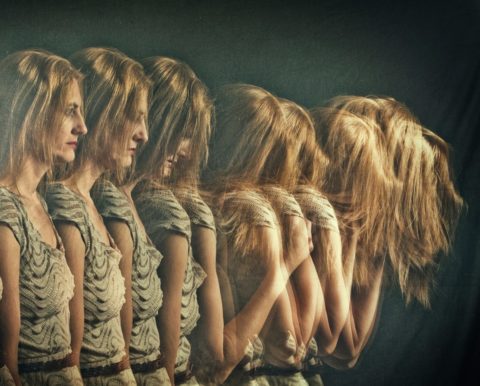How I conquered addiction and postpartum depression

Most people are usually surprised to hear that I suffer from mental illnesses and I kind of like the idea of saying, “This is what a mental illness can look like.” You have a preconceived idea, based on nothing—on extreme cases, on movies—that an addict is homeless, paper-bagging it. But an addict can also be extremely high-functioning and successful and just dying inside. We’re not lying in bed, crying—of course, there are moments like that—but many of us are active in society, going to work, getting through the days like anybody else would. Yes, I suffered from depression, addiction and then postpartum depression, but I got through it. Here’s how:
Addiction
In first-year university I started to drink more often. I felt really uncomfortable in social situations, which I now think was a symptom of my depression, but I didn’t really connect the two, so I would drink and then I would feel like I fit in. It worked for a little while, until it didn’t. I was just a train wreck. I had a moment of clarity, when I was like, “I don’t want this to be my life.” My family has a history of mental health issues of varying types and I could see where it was going. I decided to get some help.
The first year was the worst. In North America, drinking is associated with everything—golfing, bowling, getting together for dinner at someone’s house. And when you cut something out, it feels like it’s coming at you from all angles; suddenly I noticed how many bars there were. It’s like a hypersensitivity to alcohol in day-to-day life. And then people don’t understand why you’re not drinking. They’re like, “Are you pregnant?” I learned that it was better for me to own my recovery than to play a game, like, “I’m on a cleanse.” I tell people I had a serious problem with alcohol, and they leave me alone. But I had to find things to fill my time with to keep me away from bars and drinking situations. I learned to sew and knit and injected myself into other activities.
Arguably the toughest part is navigating social events, when I really feel like I need to be somewhere for someone, but it could be a trigger. I wouldn’t go to a bar unless I had a really good reason to be there. But each time I was able to get through a difficult time or go to a social setting and be present and be there for people, it mended a lot of broken relationships with my family and friends. All of those things motivated me to keep going.
I’ll be sober four years this August, but around the three-year mark, I remember having this moment of shame, thinking, “I’m an addict and I have mental health issues, and, Oh, God, I’m the worst.” And then I had this shift, where I thought, “I’m not a statistic. I’m not in active addiction. I’m not in my depression. I’m doing something about it.” I work in marketing. I’m a mom. I’m there for my friends, and I still show up and have fun. I’m all of those things, but I still have mental illness in the background. That’s what mental illness looks like.
Postpartum Depression
In February 2015, a month after my son was born, I was diagnosed with postpartum depression. I was excited my whole pregnancy despite being really sick, but upon arrival was immediately full of regret. I wanted to get away from my family, and I thought that that would be the best thing for my family, and it really felt like normal thinking. I really wanted to strategize on how I could run away, and it would really be the best thing for my son and partner. I was thinking, “What have I done?” This is not how I thought it would be. I’m not a good mother. I’m feeling so detached from my son. Luckily for me, I had some recovery under my belt from the alcohol and I felt like I was really in tune with myself and I thought, “this is not normal thinking.” I really had to convince my partner, too—we’d been so prepared for the baby blues, but didn’t have a barometer for for PPD. I talked to my doula, she told me to call my family doctor. I got referred to a program at my hospital and everything happened super quickly.
Mothers (and first-time mothers, especially) are harder on ourselves. We say, “This is just motherhood. It’s difficult and trying.” But I cried for an entire day and I looked like I had been punched in the face. The minute I saw my doctor, she explained that the baby blues mean being a little bit tearful, but any continued length of crying could indicate PPD. In my mind it was the baby blues. I felt better within two weeks, thanks to support groups, my doctor and medication. Don’t be afraid to ask questions.
Getting help
Talk to someone if you’re struggling with your mental health—even if you’re just overwhelmed. And that doesn’t necessarily mean going straight to your doctor. It could be someone who you can speak to in confidence. The longer you wait, the more dangerous it can get. And your thoughts can lie to you. For me, now I’ve learned to differentiate between an obsessive thought, an addictive thought and a depressive thought, which are all kind of similar. I ask myself, “What is driving this?” I use the acronym H.A.L.T., which stands for Hungry, Angry, Lonely, Tired. Those are major triggers for me, things I check myself for. If I’m feeling obsessive, depressed or feeling a craving, I’d say, “OK, I’ve been up for the past two nights because Luca is teething, so I’m feeling a bit more vulnerable and exposed because I’m tired.” Or maybe I haven’t been doing the things that help me to stay healthy, like meditation, which has been part of my recovery. Sure, it’s awesome to sit on a meditation pillow, but meditation for me can also be taking a minute to focus on my breath while going to the washroom. It’s gathering myself and being present and not getting too wrapped up in the future or the past, because we don’t control what’s going to happen tomorrow. I have no control over the outcome; I can only control what I’m inputting to life. —As told to Emilie Dingfeld
Jennifer Baxendale is sharing her story on behalf of CAMH’s One Brave Night initiative, which recognizes that the nights are the most challenging times for many people with mental illness. Learn more about the fundraiser here.








